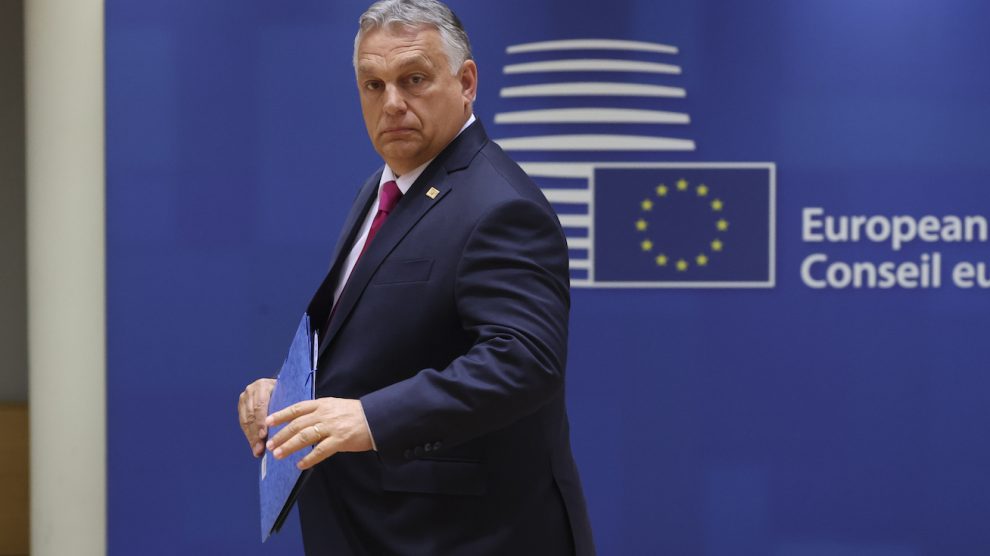Spooked by the real possibility of losing out on billions of euros of EU funds, Hungarian Prime Minister Viktor Orbán backed down and approved a crucial new aid package for Ukraine.
The European Union has long mulled over how to deal with Hungary, the illiberal troublemaker in its midst. It can’t kick Budapest out, although in theory, the possibility does exist for a member country to be stripped of its EU rights and responsibilities, including the loss of its voting and veto rights on the European Council.
It is colloquially referred to as the “the nuclear option” because it was only ever meant to serve as a deterrent. It was certainly never designed to be used, no matter how tempting it might sometimes appear.
- Explainer: Could the EU really expel Hungary?
- Extension of fuel price cap would put Hungary on course for yet more EU trouble
- Central and Eastern Europe’s persistent economic divides
Instead, Brussels has in recent times taken an approach parents have been making use of forever: when children misbehave, withhold their pocket money. In the EU’s latest battle with Hungary, it worked.
Hungarian Prime Minister Viktor Orbán on Monday caved in to EU pressure, agreeing a deal that will unlock 18 billion euros in aid for Ukraine.
Orbán had last week vetoed the aid package – which requires the consent of all 27 EU member states because of the way the common borrowing will be raised by the EU – in a desperate bid to force Brussels to release frozen EU funds to Budapest.
The blackmail failed, not least because Hungary is broke. Last week it had to bring an end to a cap on fuel prices that had been in place since spring, and which Hungary had wanted to carry over into next year. Faced with mounting economic woes, including the EU’s highest inflation and a struggling forint, Orbán appears to have had little choice but to accept the terms Brussels offered.
The deal
In November, the European Commission proposed that the bloc continue to freeze about 7.5 billion euros in cohesion funding to Hungary over concerns about democratic backsliding and the possible mismanagement of EU money.
The Commission also proposed placing conditions on Hungary’s Covid-19 recovery plan, worth 5.8 billion euros, insisting Budapest carry out a series of democratic reforms to unlock the funding.
The deal – struck by EU ambassadors in Brussels ahead of a European Council meeting later this week – means that the EU will now approve Hungary’s recovery plan, although as the Commission wished, no money will flow until Budapest meets numerous conditions.
Approval of the recovery plan, however, which had to be done by December 19, means Hungary will not lose any money: had the plan not been approved, Budapest would have missed out on up to 70 per cent of its recovery funding.
EU governments also agreed to reduce to 6.3 billion euros from 7.5 billion euros the amount of EU funds for Hungary that the European Commission wanted frozen. Orbán spent the unfrozen 1.2 billion euros almost immediately: on Tuesday morning, he announced that pensions would rise by 15 per cent from January 1.
In exchange, besides dropping his veto of the crucial financial assistance for Ukraine, Orbán also agreed to remove his objections to the implementation in the EU of a global minimum corporate tax of 15 per cent, proposed by the Organisation for Economic Co-operation and Development (OECD), a club of mainly rich countries.

What it means for Ukraine
The deal means that the EU will be able to financially support Ukraine throughout 2023.
The aim is to provide stable, regular and predictable financial assistance – averaging 1.5 billion euros per month – which will help cover a significant part of Ukraine’s short-term funding needs for 2023, which the Ukrainian authorities and the International Monetary Fund estimate at three to four billion euros per month.
The funds will be provided through loans on highly preferential terms to be repaid over 35 years starting in 2033.
“Ukraine can count on the EU. We will continue to support Ukraine, also financially, for as long as it takes. Ukraine can count on regular financial help from the EU throughout 2023,” said Zbyněk Stanjura, Minister of Finance of Czechia, which currently holds the EU’s six-month rotating presidency.
Hungary’s initial veto had forced the EU to begin looking for alternative ways to push through the aid package, including individual countries providing national budgetary guarantees: something which could have delayed the process at a time when Ukraine needs assistance more than ever.
Nevertheless, the support now approved by all EU members still needs to be matched by similar efforts from other major donors in order to cover all of Ukraine’s funding needs for 2023.
Photo: Viktor Orbán at a meeting of the European Council earlier this year. © European Union
Unlike many news and information platforms, Emerging Europe is free to read, and always will be. There is no paywall here. We are independent, not affiliated with nor representing any political party or business organisation. We want the very best for emerging Europe, nothing more, nothing less. Your support will help us continue to spread the word about this amazing region.
You can contribute here. Thank you.


